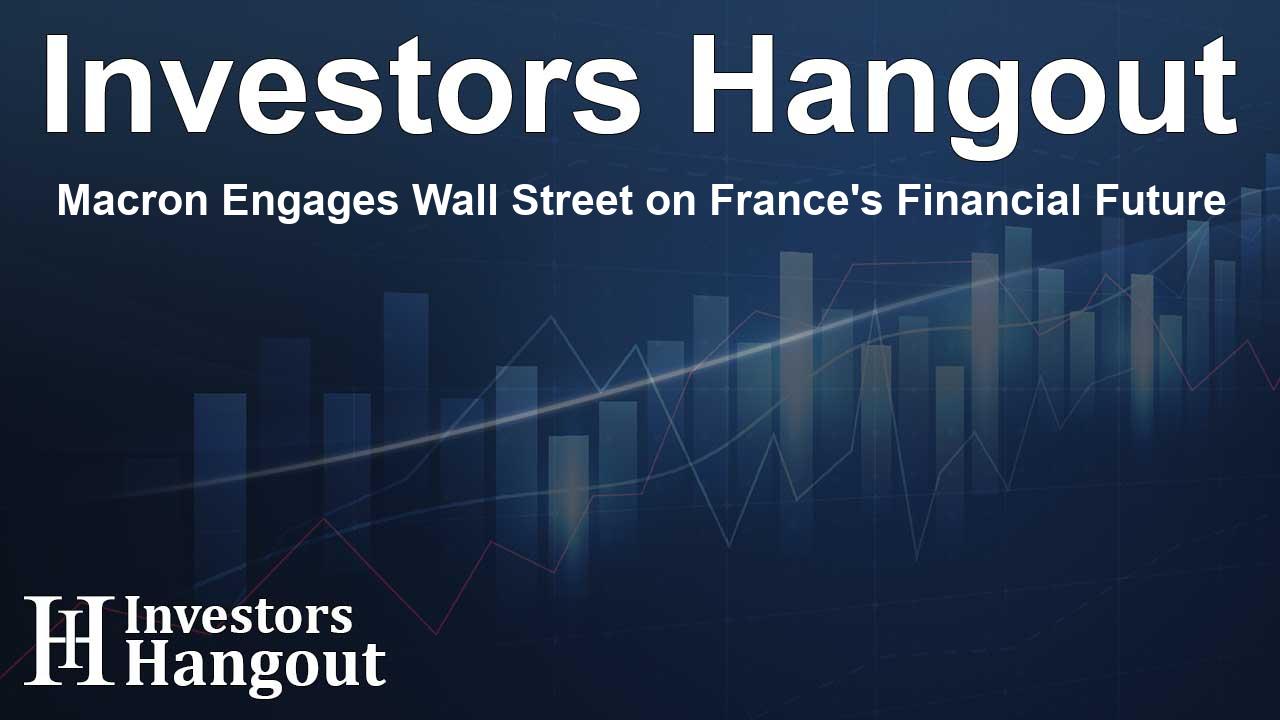Macron Engages Wall Street on France's Financial Future

Macron Engages Wall Street on France's Financial Future
French President Emmanuel Macron has recently opened up about France's financial challenges during a meeting with leading U.S. financiers. This candid engagement aimed to mitigate concerns surrounding the country's substantial deficits and potential tax hikes.
Meeting Overview
In a recent meeting held in New York, Macron gathered with over a dozen top Wall Street executives during the U.N. General Assembly. This was an effort to assure them about the economic stability of France, which is currently facing deteriorating fiscal conditions.
Among the notable participants were prominent figures such as John Waldron, President of Goldman Sachs, and Stephen Schwarzman, CEO of Blackstone. Macron's discussion spanned over an hour, allowing for an open dialogue about the current state of the French and European economies.
Tax Future and Economic Realities
During the discussion, Macron addressed the possibility of increasing taxes as a means of addressing the country's growing budget deficit. This raised concern among the investors present, though the president sought to maintain a balanced view. He emphasized the importance of not overreacting to potential tax adjustments, stating his primary goal was to cut spending rather than impose heavy tax burdens.
Historically, Macron had moved towards reducing taxes for large businesses, and the prospect of reversing this trend indicates a significant shift in fiscal policy. Investors were informed that the goal was to improve public finances while ensuring that essential services remained funded.
Reassessing Investment Perspectives
Macron also took the opportunity to position France as an appealing destination for investment. The president referenced past “Choose France” summits aimed at changing the global perception of the country. He has expressed a desire to portray France as a confident, pro-business nation, despite prior reputational challenges.
Focus on Foreign Investment
Foreign investments play a crucial role in the French economy, with foreigners owning nearly 50% of the country's governmental debt, a higher proportion compared to other eurozone nations like Italy and Germany.
Addressing Economic Slowdowns
Both the domestic and European economic slowdowns have prompted the need for financial adjustments. Macron conveyed that temporary tax increases might be necessary to enhance public finances and stabilize the economy. This marks a significant change from previous policies aimed at fostering business growth.
Forward-Looking Strategies
As part of the strategic discussions with Wall Street, Macron raised topics including advances in artificial intelligence, the future of nuclear energy, and the importance of regulatory frameworks. These elements highlight France's commitment to staying at the forefront of innovation and sustainable growth.
Looking Ahead
The meeting occurred in the context of a new governmental budget that outlined a roadmap to reduce the deficit below 6%. The Prime Minister has proposed measures to achieve a 5% deficit reduction by 2025, which will entail both cuts and temporary tax hikes for certain sectors.
Conclusion
Macron’s proactive approach with business leaders signals a commitment to transparency regarding France’s fiscal situation. While challenges loom, there remains a robust dialogue regarding France’s investment potential, ensuring stakeholders stay informed and engaged in the country’s economic trajectory.
Frequently Asked Questions
What were the main topics discussed in Macron's meeting with Wall Street?
Macron discussed France's financial woes, potential tax increases, and opportunities for investment in various sectors including AI and nuclear energy.
Why is France facing budget challenges?
France is experiencing a significant fiscal deficit exacerbated by economic slowdowns and rising governmental expenses.
What is Macron's goal regarding fiscal policy?
Macron aims to cut spending while considering temporary tax increases to stabilize the country's budget and improve investor confidence.
How is foreign investment significant to France's economy?
Foreign investors hold approximately 50% of France's government debt, showcasing the importance of international confidence in financial stability.
How does this meeting impact France's international reputation?
By addressing concerns and positioning France as a dynamic investment environment, Macron seeks to enhance the nation's image as a pro-business entity.
About Investors Hangout
Investors Hangout is a leading online stock forum for financial discussion and learning, offering a wide range of free tools and resources. It draws in traders of all levels, who exchange market knowledge, investigate trading tactics, and keep an eye on industry developments in real time. Featuring financial articles, stock message boards, quotes, charts, company profiles, and live news updates. Through cooperative learning and a wealth of informational resources, it helps users from novices creating their first portfolios to experts honing their techniques. Join Investors Hangout today: https://investorshangout.com/
Disclaimer: The content of this article is solely for general informational purposes only; it does not represent legal, financial, or investment advice. Investors Hangout does not offer financial advice; the author is not a licensed financial advisor. Consult a qualified advisor before making any financial or investment decisions based on this article. The author's interpretation of publicly available data shapes the opinions presented here; as a result, they should not be taken as advice to purchase, sell, or hold any securities mentioned or any other investments. The author does not guarantee the accuracy, completeness, or timeliness of any material, providing it "as is." Information and market conditions may change; past performance is not indicative of future outcomes. If any of the material offered here is inaccurate, please contact us for corrections.